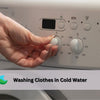Laundry Detergent Allergies 101: Causes, Symptoms and a Solution
- by Brodie Cook
Have you ever had an itchy, red rash that won't go away? It might be caused by your laundry detergent. Laundry detergent allergies are more common than you might think. Many people experience skin irritation, redness, and itching after using certain detergents.
Laundry detergent allergies happen when your immune system reacts to something in the detergent. This can cause a rash or make your skin very dry and itchy. Sometimes, you might even have trouble breathing. Don't worry, though! There are ways to figure out if you have a laundry detergent allergy and how to make it better.
Common Symptoms of Laundry Detergent Allergies

If you have a laundry detergent allergy, you might notice some changes in your skin. Your skin might feel itchy or look red, especially in places where your clothes touch your body. You might also see small bumps or a rash that feels dry and rough.
Sometimes, the skin can swell up and feel sore or like it's burning. This is more likely to happen where your clothes are tighter, like around your waist or wrists. In very bad cases, some people might even have trouble breathing, like coughing or wheezing. If this happens to you, it's important to see a doctor right away.
Causes of Laundry Detergent Allergies

Laundry detergents have many different ingredients that can cause allergies. Some common ones are fragrances, dyes, surfactants (which help clean clothes), enzymes, and preservatives. These ingredients can make your skin react badly, especially if you already have sensitive skin.
There are two main types of reactions to laundry detergent. One is called allergic contact dermatitis (ACD), which happens when your immune system reacts to something in the detergent. The other is irritant contact dermatitis (ICD), which happens when the detergent irritates your skin directly, without involving your immune system.
Some people are more likely to get laundry detergent allergies than others. If you have sensitive skin or someone in your family has allergies, you might be more at risk. Using the same detergent a lot can also make you more likely to develop an allergy over time.
Diagnosing Laundry Detergent Allergies
If you think you might have a laundry detergent allergy, there are a few ways to find out for sure. One way is to do a patch test. This is where a small amount of the detergent is put on your skin to see if it causes a reaction. You can also try stopping using the detergent for a while to see if your symptoms go away. This is called the process of elimination.
If you're not sure what's causing your symptoms, it's a good idea to talk to a skin doctor (dermatologist) or an allergy doctor (allergist). They can help figure out if you have an allergy and what might be causing it.
Remember, there are two types of reactions to laundry detergent: allergic contact dermatitis (ACD) and irritant contact dermatitis (ICD). ACD happens when your immune system reacts to something in the detergent, while ICD happens when the detergent just irritates your skin. A doctor can help you tell the difference between the two.
Treatment and Management of Allergic Reactions
If you have an allergic reaction to your laundry detergent, there are some things you can do to feel better. First, wash the affected areas of your skin with cool water. This can help remove any leftover detergent and make your skin feel less itchy. You can also try putting on some creams or lotions that are made to help with allergies. These include things like hydrocortisone cream, calamine lotion, or even taking an oatmeal bath.
You can also try taking antihistamines, which are medicines that help reduce allergic reactions. These are available over-the-counter, which means you can buy them without a doctor's prescription.
It's important to stop using the detergent that caused your allergic reaction. This will help prevent further irritation to your skin. If your symptoms are severe or don't go away after a couple of weeks, it's a good idea to see a doctor. They can help you find the best treatment for your specific situation.
Prevention Strategies for Laundry Detergent Allergies
If you want to avoid getting a laundry detergent allergy, there are some things you can do:
- First, choose a detergent that is made for people with sensitive skin. Look for detergents that are hypoallergenic, which means they are less likely to cause an allergic reaction. Also, try to find detergents that don't have any fragrances or dyes, as these can often trigger allergies.
- When trying a new detergent, it's a good idea to do a patch test first. This means putting a small amount of the detergent on a small area of your skin to see if it causes a reaction before using it on all your clothes.
- Make sure to follow the instructions on the detergent bottle and use the right amount. Using too much detergent can leave more of it on your clothes, which can irritate your skin. You can also try using an extra rinse cycle to make sure all the detergent is washed out of your clothes.
- Wearing loose, breathable clothes can help prevent allergic reactions too. Tight clothes can rub against your skin and make irritation worse. Avoid using fabric softeners and dryer sheets, as these can also contain allergens.
Alternative Laundry Solutions for Sensitive Skin
Gentle on Skin
Fragrance-free detergent sheets made for sensitive skin. No dyes, no phosphates. Just a clean that’s kind and gentle to you and your clothes.
Shop Fragrance-Free Laundry SheetsIf you have sensitive skin or are worried about laundry detergent allergies, there are some other options you can try besides regular detergents. One great choice is Lucent Globe detergent sheets. These sheets are made with natural ingredients and are free from allergens that can irritate your skin. They are pre-measured, so you always use the right amount and also phosphate free, which means they are kinder for the environment compared to traditional detergents.
Try Lucent Globe Detergent Sheets Here!
Another option is to use things like laundry balls or soap nuts. Laundry balls are small balls that you put in your washing machine instead of detergent. They work by using the power of water to clean your clothes. Soap nuts are actually dried fruit shells that contain a natural soap. You can put them in a small bag and use them in your washing machine like you would use detergent.
If you enjoy DIY projects, you can even try making your own laundry detergent at home using simple ingredients like baking soda, washing soda, and castile soap. This way, you know exactly what's going into your detergent and can avoid any ingredients that might cause allergies.
Remember, if you have sensitive skin, it's important to choose laundry products that are gentle and free from harsh chemicals. Experimenting with different options can help you find the best solution for your needs.
Conclusion
Laundry detergent allergies can be frustrating, but there are many ways to manage them. By understanding the common symptoms, causes, and treatment options, you can take control of your allergies and find relief. Remember to look for hypoallergenic, fragrance-free, and dye-free detergents, and don't be afraid to try alternative laundry solutions like Lucent Globe detergent sheets.
Taking care of your skin is important, and that includes being mindful of what you use to wash your clothes. If you suspect you have a laundry detergent allergy, don't hesitate to talk to a doctor and try out some of the tips we've discussed. With a little effort and experimentation, you can find the best laundry routine for your sensitive skin and say goodbye to irritation and discomfort. Give allergen-free laundry solutions a try and see the difference for yourself!
FAQs About Laundry Detergent Allergy
How can I determine if I am allergic to my laundry detergent?
You can try switching to a different fragrance-free detergent to see if your symptoms improve. Consult a dermatologist for an allergy test to determine the specific cause.
Can laundry detergent residue cause skin reactions?
Yes, leftover detergent residue on freshly washed laundry can come into contact with your skin and cause adverse skin reactions, especially if you are sensitive or allergic to certain ingredients.
What steps can I take to prevent laundry-related allergic reactions?
To prevent laundry-related allergic reactions, consider using hypoallergenic or fragrance-free detergent, double rinse your clothes, avoid fabric softeners, and wash new clothing before wearing to remove any chemicals.
How can I relieve itching and inflammation caused by laundry detergent allergies?
Applying a soothing lotion, taking an antihistamine, using a cold compress, and wearing loose-fitting clothing can help relieve itching and inflammation caused by laundry detergent allergies.
What is the difference between an allergic reaction and irritant contact dermatitis from laundry detergent?
An allergic reaction is triggered by your immune system responding to a specific allergen in the detergent, while irritant contact dermatitis is caused by direct irritation to the skin from certain ingredients in the detergent.

 Dishwashing
Dishwashing Laundry
Laundry Bundles
Bundles Surfaces
Surfaces Toilet
Toilet Handsoap
Handsoap Multi-Purpose
Multi-Purpose Floor
Floor




